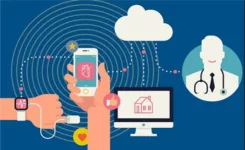Much time has passed since the IoT had promised to invent tools that will make healthcare better and cheaper. But for some reason, these promises are still not realized, a specialist from Kaa tells about this.
The IoT is constantly promising soon transformation in the variety of industries, from delivering goods to building and security. But the healthcare, compared to other industries, have more to gain. Both, providers in healthcare and those who make healthcare devices, are still waiting for the moment when the Internet of Things will start the revolution in gathering the patient’s data and care delivery.
Some of those innovations are becoming real one by one, and others are still postponed for some reason. The whole world is currently waiting for two healthcare innovations to come out to the market. Let’s see what people may receive today.

Prototype of a Smart Bandage
It is truly exciting to know that progressive smart bandages prototype was developed by Tufts University researchers. It was developed with the help of flexible electronics and made for both, monitoring the state of skin wounds and analyzing, choosing and delivery of needed drugs to the patient for healing promotion. A bandage is measuring pH and temperature of chronic skin wounds and after that, it has to deliver proper treatments in order to avoid the consequences like continuous infections or, what’s more terrible, amputations, which are often the outcome of diabetes, deep burns, and other diseases.
Of course, it is totally clear in which way the IoT services may be applied to these smart bandages. Patients will have the opportunity to keep an eye on the treatment progress and adjust it whenever it is needed even without seeing the doctor. Researchers, in their turn, have the full access to the healing process data and to the information concerning its efficiency.
However, even though bandages are being actively tested, the next step is the critical trials. So, for now, nobody knows how much time it will take and what will be the price of these devices.
Medical Speakers Which Are Not Smart At All
While we all are waiting for innovative medical smart bandages to appear in the market, most people already have an access to digital assistants that could give a medical advice, the so-called “smart speakers” (like Google Assistant, Alexa, Siri, etc). But in fact, this extremely affordable innovation is still not very good.
The main problem with the smart speakers is that all IoT devices are connected to the web and, although the internet is an inexhaustible source of useful information, while searching for answers to health-related questions we can spend a lot of time until the correct answer will be found. The same can be said about digital assistants like Amazon Alexa that might find totally correct answers to most basic questions, but due to the limited knowledge of the medical world, you’ll most likely receive information from WebMD or Wiki.
Of course, sometimes these Alexa’s answers may be of great help to some people, but sometimes those advices can be extremely dangerous for people who have any kind of allergies or other pre-existing conditions.

Why Healthcare IoT Development is Stuck
So, we hope now you know that it isn’t smart to rely on the advice given by the smart speaker. Yes, it is not a good idea. But to say the truth, these speakers and nothing more – here is what healthcare IoT can offer us today. You may ask, what about those innovative smart bandages. Unfortunately, nobody knows even the approximate day when it can be released.
In general, looking at this inconsistency, it is easy to understand how the IoT help healthcare today. Namely, the coolest stuff is still at the stage of development, and affordable boons cannot be trusted.








